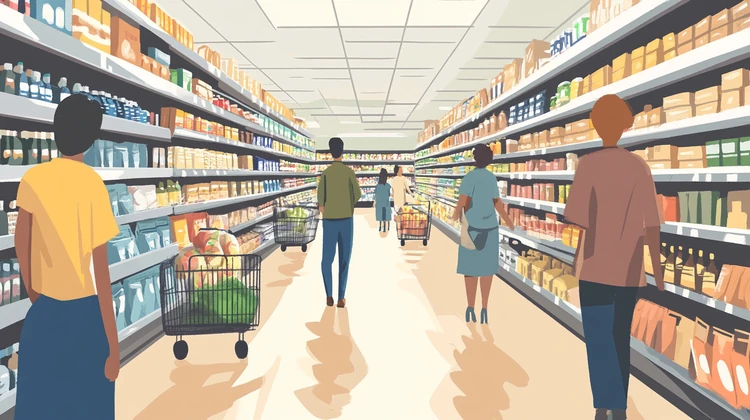And these products dont taste like cardboard anymore, either

Are grocery stores playing two ends against the middle? As chains continue to be accused of gouging consumers, theyre also bulking up on private labels to dangle an up to 40% savings compared to national brands.
Despite there being verylittle a shopper can do to force a grocers hand at high prices, more and more grocery chains are feverishly adding private labels to their shelves tomake things seem like a fair trade-off.
While Costco, Trader Joes, and ALDI have been all-in on private labels for eons, the big grocery chains awakening began last November at the Private Label Manufacturers Associations annual trade show, when a record 1,600vendors showed up with more than 10,000 products. Nearly a year later, things have gone into high gear with grocers expanding their private label portfolios like crazy.
Kroger's "Smart Way" brand experienced remarkable growth in the past year, becoming the fastest-growing private label brand, with sales volume increasing by more than 100%.
Notably, store brands from Dollar Tree and Dollar General made a strong showing, securing four spots among the top 15 fastest-growing private label brands. Walmart's private label brands maintained their dominance as the largest in the market, with over half of US households purchasing many of their brands in the past year.
Some of these chains are getting creative and going past packaged goods. Private label fruits (Field & Vine) have been added to Kroger's store shelf, while Sam's Club has started an initiative that lets its members "co-create" products for its Member's Mark brand to allow for greater personalization.
If youre not buying private label products, youre missing the boat
New research shows that its full speed ahead for private labels: 44% of U.S. consumers have already permanently switched some of their stables to private label versions, according to a January 2024 survey from Bazaarvoice.
Another 46% of shoppers say they plan to buy somewhat or much more private brands over the next year or so. Add those together and you get an impressive 90% of the U.S. consumers..
People are definitely buying private label because its a cheaper alternative, Diana Sheehan, principal and CEO of PDG Insights, said. But theyre also buying private label because of the value they get from new items and high quality products and unique products and things that they feel really are tailored to their needs and their focus from the retailers that they trust in their community.
And the savings are worth it, too. Grocery shoppers can typically save around 10%-30% on private label products compared to national brands. Some studies have shown that the savings can be even higher, reaching up to 40% or more for certain items.
But, do they taste yucky?
Private label foods of today are trying desperately to reverse the perception that the taste doesnt come close to what the brand name versions do. But, this rising tide is leading grocers to be picky about where their private label products are coming from and whos making them.
Nowadays, many of the store brands are actually made by the more expensive name brand then simply repackaged. For example, when RatherBeShoppings Kyle James decided to play detective, he found these examples:
-
Costcos Kirkland Tuna is made by none other than Bumblebee Tuna;
-
Walmarts Great Value Canned Vegetables are sourced from suppliers like Del Monte, Green Giant, and Libbys;
-
ALDIs Millville Cinnamon Crunch Squares are made by General Mills, whichalso makes Cinnamon Toast Crunch;
-
Publix Brand Deli Meats are made by various meat suppliers, including Boars Head and Hormel;
-
Kroger Brand Cereals are manufactured by General Mills and Kelloggs; and
-
Food Lion Brand Coffee is manufactured by Kraft Heinz and J.M. Smucker Company.
But, dont expect aCoreo to be an Oreo or any other product that riffs on a big brands name. While 43% of consumers purchase private label brands to save money, only 29% of consumers think private label brands are just as good as name brands.
Still, if youre saving up to 40%, it might be worth a little trial-and-error to find out what private label products hit the mark and which ones dont.
Photo Credit: Consumer Affairs News Department Images
Posted: 2024-09-05 10:37:28




















